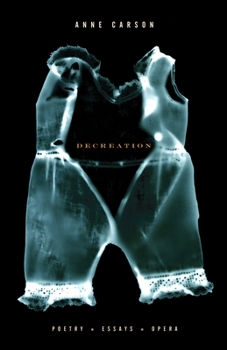Decreation: Poetry, Essays, Opera
Select Format
Select Condition 
Book Overview
One of the most interesting gatherings of material that any poet has published within living memory. --The Economist
Format:Paperback
Language:English
ISBN:1400078903
ISBN13:9781400078905
Release Date:October 2006
Publisher:Vintage
Length:272 Pages
Weight:0.58 lbs.
Dimensions:0.7" x 5.1" x 8.0"
Customer Reviews
3 ratings
Exquisite, Brilliant, Intriguing!
Published by Thriftbooks.com User , 16 years ago
Everyone should read this book! It examines Simone Weil, Stevens, and other Modern and Contemporary Poets. I adore this book. "Nothing that is not there and THE nothing that is." Beautiful, moving, thrilling, lucid and sublime.
Outlaw time with Anne Carson
Published by Thriftbooks.com User , 18 years ago
Decreation is coy, playful, obscure, difficult & profound. In other words - it is experimental, like other works by Anne Carson. Where is the tiny give that begins to give you entry? The book is transparent - yes, but slippery (note the undergarment photographed like a jellyfish on the cover). In the book are tableaus of different approaches to annihilation featuring Sam Beckett and God, Marguerite Porete and God, Simone Weil and God. In the interludes, witness Sokrates and Demosthenes the orator "who knows how to make his nouns rain like blows", Virginia Woolf and Elizabeth Bishop together in a sleep-assay that describes To the Lighthouse as a "novel that falls asleep in the middle". Decreation also contains an hommage to Antonioni, as strange and beautiful as Antonioni's films. Perhaps the "give" you're looking for is on page 46, where Carson recounts Antonioni directing Lucia Bose in Story of a Love Affair - "To obtain the results I wanted I had to use insults, abuse, hard slaps." Then again maybe not. But just when you think you're in here's another clue from AC - "If God were knowable, why would we believe in him?" Slap!
Intelligence Has No Other Name
Published by Thriftbooks.com User , 19 years ago
Intelligence has no other name than Anne Carson. And "Decreation" proves that Ms. Carson has not lost the good of intellect as she pursues an incomphrehensible sublime through the intricate paths that connect the uber-sublime Simone Weil, Margerate Porete, Longinus, the negative theology of Samuel Beckett, and a thousand other things, themes, and people. Though not all of the pieces in this volume are verse all are pure poetry shifting through an intense tesseract where things that are most traditional are radically re-interpreted in direction that is surreal, avant-garde, and yet classical. This kind of work is an example of what strong poets should be attempting to do today and it is one reason why Ms. Carson is the brightest bard of our hour, worthy to stand on the heights with Emily Dickinson and Paul Celan. As I read these poems and essays I feel that my own imagination and intellect are struck by a light that is feminine and precise, strong, even rutheless, breath taking in its wilful ascents and descents, and firmly dedicated to its own unique spiritual quest. There are passages in the poems in which I encountered the truly indescribable. Few are the poets these days that will dare to take on such possiblities and labors. Most poets writing are grinding out stuff that sounds like the slightly piqued pseudo-spiritual musings of third-rate diarists. But not Ms. Carson. I must confess I can hardly wait for her next volume but for now I have too much to ponder as I watch my own mind quietly re-organized by Anne Carson's on-going aesthetic triumphs.






